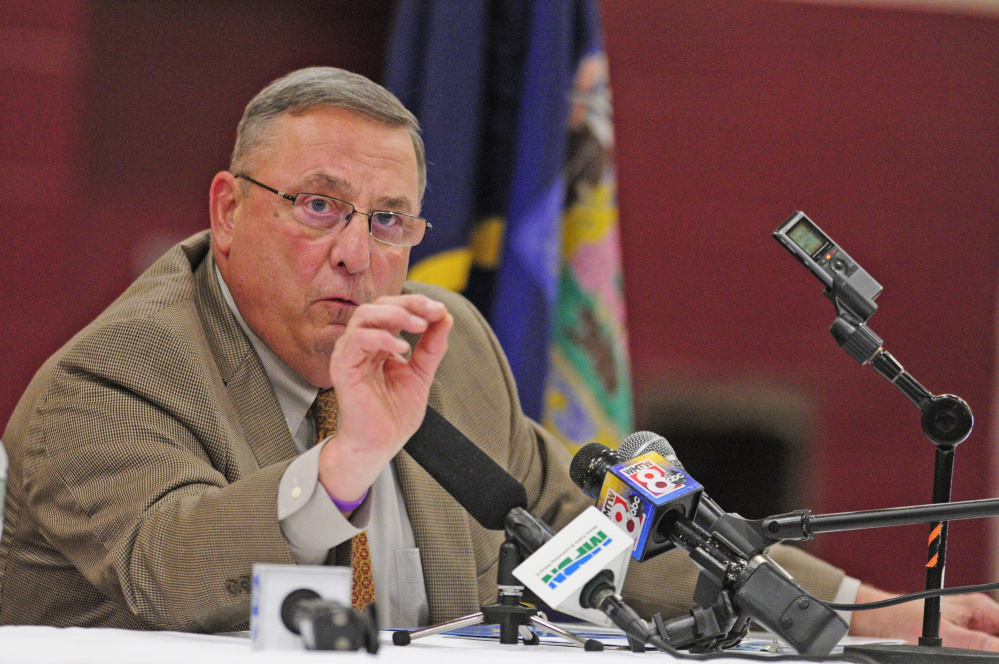AUGUSTA — Members of Gov. Paul LePage’s staff violated his policy against communicating with text messages when they used texts to strategize about a private meeting in April that is now the focus of a legal complaint by the state Attorney General’s Office.
Senior LePage staffers sent text messages to each other about how to respond after the Attorney General’s Office, as well as legislators, reporters and others, objected that an April 25 meeting of the Blue Ribbon Commission to Reform Public Education Funding was being held in private. The AG’s Office has since filed a complaint that the meeting violated the state’s open meetings law.
“(Sen. Justin) Alfond and the education activists are preparing to go ape (expletive) that it’s closed to the public and the press. Gov. (LePage) does not want press at all,” LePage adviser Aaron Chadbourne wrote in a text to LePage spokeswoman Adrienne Bennett on April 20, five days before the commission’s meeting.
Later in the same text, Chadbourne said: “I’d love to avoid a messy public fight over our lack of transparency before this even gets off the ground. Would love to know what you think we can/should do.”
The text messages were saved and printed and are among the documents filed with the Attorney General’s Office complaint that the administration intentionally subverted public-access law by making the meeting private, even after the AG’s Office warned that the meeting should be open to the public.
Text messages to Chadbourne from Democratic lawmakers on the commission also illustrate their concern about holding the meeting in private. In a chain of messages between Alfond, D-Portland, and Chadbourne, Alfond repeatedly notes his reservations about not conducting the meeting in public.
“This decision to make any of the BRC meetings not open to the public does not make sense,” Alfond, the Senate minority leader, texted at one point. Chadbourne responded that the decision wasn’t final, but the planned closed-door meeting at the Blaine House would be an opportunity to discuss the matter.
“I am extremely concerned about violating the open meeting law,” Rep. Sara Gideon, D-Freeport, texted to Chadbourne. Gideon, the assistant majority leader in the House, also offered a compromise in her message suggesting that the committee could hold an informal “social hour/breakfast” so committee members could get to meet one another and chat. “Then we could open the doors when we begin the published meeting agenda?” Gideon texted. “We should not start this whole process off on the wrong foot. Let’s give this commission the credibility it deserves.”
Chadbourne’s message to Bennett on April 20 also noted that acting Education Commissioner William Beardsley was willing to allow one reporter to attend, but did not want to allow a reporter from the State House press corps into the meeting. Chadbourne named two reporters specifically and also named others he suggested that LePage rejected as well.
“He said ‘no’ and then later called me back into the office and said we could hire our own person to sit in and write up an account of what happened and then share with the media,” Chadbourne texted to Bennett.
The messages also reveal that the state’s ombudsman for open meetings and public records, Assistant Attorney General Brenda Kielty, had contacted LePage’s chief legal counsel, Avery Day, to protest the meeting. “Brenda at AG’s Office is completely unspun by this,” Day texted. “She asked that the door be opened up to let public in for the remainder of today’s session. I said I would see but thought it unlikely.”
In his response, Chadbourne wrote he was discussing the matter with LePage’s Maine State Police security detail. Day responded, “Can I come over and talk to you so I can say I went over to check?” Chadbourne texted back: “Yes. Come in the back door.”
The text messages themselves violated an administration policy regarding public records.
LePage had ordered in 2014 that staffers not use text messaging for state business after it was revealed some officials were using text messages expressly because they do not create a public paper trail.
Administration officials said Wednesday that the policy is being changed to ensure that, if texts are used, messages are saved and printed and treated as public documents. In this case, administration officials point out, the messages were saved and turned over to the AG’s Office.
“The administration’s public communications policy has been updated given the universal use of electronic communications and the inability to prevent unsolicited communications made via electronic means,” Bennett, the governor’s spokeswoman, said in an email. “Communications by electronic means are permitted, provided the sender/recipient familiarizes themselves with archiving and Freedom of Access Act requirements and complies with these requirements.”
Bennett said staffers adhered to the new policy by retaining and disclosing the text messages involving the April meeting.
While texting is now allowed, the new policy says state business should continue to be conducted using the state’s email system as much as possible to facilitate storage and retention of public documents.
The commission was set to hold another meeting in July, but that meeting has not yet taken place. A spokeswoman for the state Department of Education told the Press Herald on Wednesday that Beardsley had, so far, been unable to find a date that worked for all the commission members.
Staff Writer Noel K. Gallagher contributed to this report.
Send questions/comments to the editors.





Comments are no longer available on this story